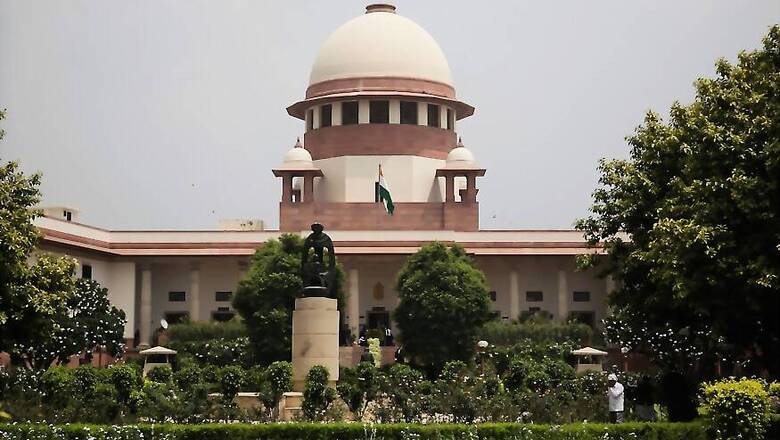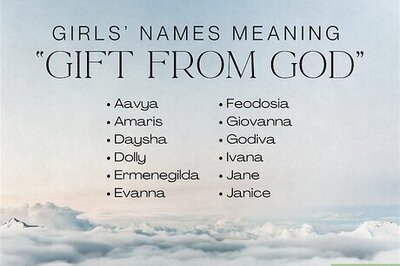
views
New Delhi: The Supreme Court on Tuesday asserted that the illegal activities of 'khap panchayats' have to be stopped completely, saying the honour killings of inter-caste couples was a social evil that "guillotined" individual liberty and freedom of choice having a "catastrophic effect" on the society.
Terming honour crimes as an assault on human dignity and the majesty of the law, a bench headed by Chief Justice Dipak Misra recommended that a special law be brought to deal with offences which are "abhorrent to law", as it laid down preventive, remedial and punitive measures to deal with these crimes.
'Khaps' are self-appointed village courts, representing a clan or a group of clans, which are found mostly in northern India, especially in Haryana and Uttar Pradesh. These have emerged as quasi-judicial bodies that pronounce harsh punishments based on age-old customs and traditions, often bordering on regressive measures.
The way the 'khaps' behave, it appears that they harbour the notion that "they are a law unto themselves or they are the ancestors of Caesar or, for that matter, Louis the XIV", the bench, which also comprised Justices A M Khanwilkar and D Y Chandrachud, said.
Observing that the 'khaps' which subscribed to honour killings "without the slightest pangs of conscience", it said the human rights of a daughter, brother, sister or son "are not mortgaged to the so-called or so-understood honour of family or clan or the collective".
The top court said the 'khap panchayats' or such assemblies cannot take law into their hands or assume the character of the law implementing agency as that authority has not been conferred upon them under any law.
It said such groups cannot take the defence that they are spreading awareness in order to justify their acts that affect others' fundamental rights or to cover up their own illegal acts.
"It (acts of khap) is simply not permissible. In fact, it has to be condemned as an act abhorrent to law and, therefore, it has to stop. Their activities are to be stopped in entirety. There is no other alternative. What is illegal cannot commend recognition or acceptance," it said.
It said any kind of torture or torment or ill-treatment in the name of honour, amounts to "atrophy" of an individual's choice relating to love and marriage and such "vicious" crimes by any assembly, under any name, "is illegal and cannot be allowed a moment of existence".
The bench said "honour crime is the genus and honour killing is the species, although a dangerous facet of it".
"However, it can be stated without any fear of contradiction that any kind of torture or torment or ill-treatment in the name of honour that tantamounts to atrophy of choice of an individual relating to love and marriage by any assembly, whatsoever nomenclature it assumes, is illegal and cannot be allowed a moment of existence," it said.
The directions and observations by the bench came on a plea by NGO Shakti Vahini, filed in 2010 seeking protection of couples from honour killings.
The top court noted that Article 21 which provides for protection of life and liberty and guards basic human rights and equality of status, has been unceremoniously shown the exit by the actions of these panchayats "who, without the slightest pangs of conscience, subscribe to honour killing".
"To meet the challenges of the agonising effect of honour crime, we think that there has to be preventive, remedial and punitive measures," the bench said, directing that the guidelines laid down by it have to be carried out within six weeks from today by the state governments.
The preventive measures laid down discourage holding of any meeting by 'khap panchayat' to deal with matters of inter-caste or inter-faith marriages, while the remedial and preventive steps come into play if the khap holds a meeting and issues a diktat.
Supporting the freedom of adult men and women to choose whom they should marry, it said "consent of the family or the community or the clan is not necessary once the two adult individuals agree to enter into a wedlock. Their consent has to be piously given primacy".
The bench said when two adults consensually choose each other as life partners, "it is a manifestation of their choice which is recognised under Articles 19 and 21 of the Constitution”.
"Such a right has the sanction of the constitutional law and once that is recognised, the said right needs to be protected and it cannot succumb to the conception of class honour or group thinking which is conceived of on some notion that remotely does not have any legitimacy.”
"Therefore, the khap panchayat or any panchayat of any nomenclature cannot create a dent in exercise of the said right," it said.
The bench also said that informal institutions, like khap panchayats, are not recognised under the law for determination of criminality or delivering justice.
It said that a majority group in the name of class or "elevated honour" of a clan cannot call for presence of a couple or force their appearance as if they are the "monarchs of some indescribable era who have the power, authority and final say to impose any sentence and determine the execution of the same".


















Comments
0 comment